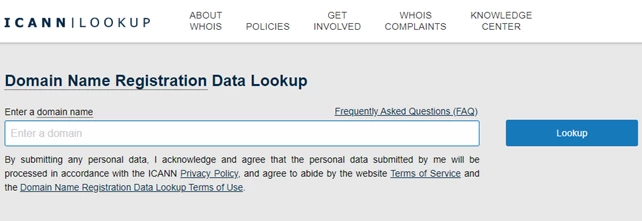List of content you will read in this article:
So, you have a new and amazing idea for a site. Great, you spent hours trying to come up with a simple yet catchy domain name. Now you try to register it, but a very unfortunate thing happens… someone has already claimed your desired domain name. through this article, you will get to know who is the owner of domain name.
Although initially, it could be a little bit of a let-down that your dream domain name is already taken, there are a few solutions you could try. One option is to rebrand and come up with a different name or try to purchase this name from the owner, the latter option being the best if you already have a part of the site ready.
Do not forget, that even a registered domain name is still possibly available if you can find the owner. Actually, buying and reselling domains is a big business in itself.
Why do you need to check domain name owner?
Of course, the most obvious reason to search for the domain owner is to attempt to purchase the domain from them. However, this is not the only reason to want to know who owns a specific domain. If there is a site that looks like a genuine big corporation website, but something about it just seems a bit off, checking the ownership of said site might save you from a phishing scam or potential installation of malware.
Another reason would be to find out the contact information of the site owner if it is not provided on the site itself. There might be many reasons to do so such as asking questions about a service or product, proposing business offers, and reporting technical problems.
Who is the owner of domain name?
When searching for a domain’s owner, multiple individuals’ contacts can surface as representatives for technical support, billing, and administration. The complete legal owner, however, is the registrant (i.e. the person or entity whose name the domain has been registered with a domain registrar).
As long as the registration fees are paid on time, this is the person who had full rights to the domain and full control over selling it if he or she wishes to.
How to find domain owner?
Now that you know why you might want to search for the owner of a domain and who exactly has the legal rights to it, let us explain a few different ways you can find out who owns a specific domain.
1. Check the site
If the domain was originally bought as an investment for the purposes of reselling, the current owner will make it easy for you to contact them. Sometimes it might even state on the site that this domain is for sale with a contact form included that you could fill out.

On the other hand, if the domain is currently in use by an active site, there are high chances of finding this information through the “About Us” or “Contact Us” page. This simple check might help you save some time and find the domain owner.
2. Search the WHOIS directory
Whenever a new domain is registered, the registrar is required to collect some basic contact information. This information is then submitted to the WHOIS directory, creating a large database of who runs each website on the net.

Therefore, searching the WHOIS directory should be the next step on the list if the first method did not work. Simply visit the ICANN lookup subdomain and enter the desired domain name in the search bar. Click “Lookup” and scroll down. Here you will find all the WHOIS data on the domain name.
If the domain owner did not pick the “WHOIS Protection”, also known as the “Domain Privacy Protection” option when registering the domain, his or her contact information will be seen there.
Of course, in most cases, people opt-in for domain privacy protection, thus you will only see the original domain registrar and the expiration date. In this case, you will know if the domain will be available again soon (if the owner decides to not renew the said domain).
Even if that is not the case, knowing the domain registrar is also a plus because then you can do the following.
3. Contact the domain registrar
Almost any respectable domain registrar offers WHOIS protection which keeps the domain owner’s information from being listed on the WHOIS directory. Since this add-on only costs a few bucks more, most domain owners pick it, making it impossible to get their contact information from the WHOIS directory.
Despite this misfortune, however, not all options are exhausted. The next thing you should do is contact the domain registrar. If their site is not listed on the WHOIS directory, simply Google its name and you should find it quite easily.
Although the domain registrar will not provide you with the owner’s contact information, you can still write them an email letting them know the domain you are interested in buying. They can pass your contact info onto the domain owner without violating any privacy concerns.
4. Use Search engines and social media
If the domain owner’s information is not present on the website or the WHOIS database, it is still sometimes possible to track them down with the help of the internet. Maybe you will find the site owner’s Twitter or LinkedIn profile.
Even a simple thing like a Google search can also turn up some clues to the domain owner’s identity or contact information.
5. Check Domain Brokerages
Buying and selling domains is a whole industry all in itself, with many services existing to make transactions possible. If all the aforementioned steps produced no results, a domain brokerage or agent might be able to assist you.
These service providers offer anything related to domains, from finding an elusive domain owner to managing all aspects of a domain sale. This path may be a pricy one as desirable domain sales can be expensive and domain brokerages have their own fees, however, businesses searching for the right domain name to promote their brand might find this a worthy investment.
What’s Next?
Now that you have exhausted all your options, you must pick one of the two following paths. If you were successful in finding the domain owner and his/her contact info, you should get in touch with them and attempt to purchase the domain from them.
Contacting the Domain Owner
First, we would recommend contacting the owner via email as this is the most common and considerably professional way to contact an individual for a business proposition (purchasing a domain is technically one).
Ensure that your email conveys seriousness and professionalism to avoid it looking like spam. Here is a basic list of contents your email should include:
- Your own contact info – putting your phone number along with an email will show the domain owner that you are serious in this offer.
- Language clarifying your willingness to pay – in the initial contact email, it is probably best not to disclose the exact amount you are willing to pay, however, the owner is more likely to respond if they think it is a genuine business offer.
- Proof of legitimacy – if you already own a domain, linking it (or even better, sending your offer from a professional email) might help assure the person you are contacting that you have serious intent.
Domain Backorder
Let us say you were unable to contact the domain owner but notice that the domain registration period expires soon. In this case, one more option is on the table: domain backorder also known as drop-catching domains.
Domain backorders is a service that helps you attempt to acquire a domain name as soon as it is available for registration. This option is only available if the domain owner decided not to renew the registration, thus making the domain available for sale.
Placing a backorder does not guarantee that you will acquire your desired domain name, however, there is still a much higher chance of you getting it than if you were to try and register it yourself when it becomes available.
Do not forget that a good domain backorder service will always refund you the full amount if they were unsuccessful in drop catching the domain.
Go for a Different Domain Name
There is always a chance that even with all the aforementioned steps, the owner will flat out refuse to sell their domain or name a price that is way outside your budget. In this case, you can consider a different domain name.
Do not forget to try your domain name with different TLDs (Top-Level Domains). If the .com version of the domain is taken, maybe the .net will be available. Check out our article about the different types of domains if you wish to learn more.
Even if that is not the case, sit down and try to brainstorm other domain names. Who knows? Maybe you will come up with one that you like even more than your original idea.
Conclusion
It is not that difficult to find out who is the owner of a domain name/check domain owner, even if they purchased domain privacy protection. Now whether they agree to sell the domain to you or not, is a different story. Regardless, we hope that with the help of this article you were able to successfully determine the domain owner of the desired domain name. If you have any questions or suggestions, leave them in the comment section below.
People Are Also Reading:
![Find Who Is The Owner of a Domain name [Check Domain Owner]](/wp-content/uploads/2020/07/cover624-main.webp)